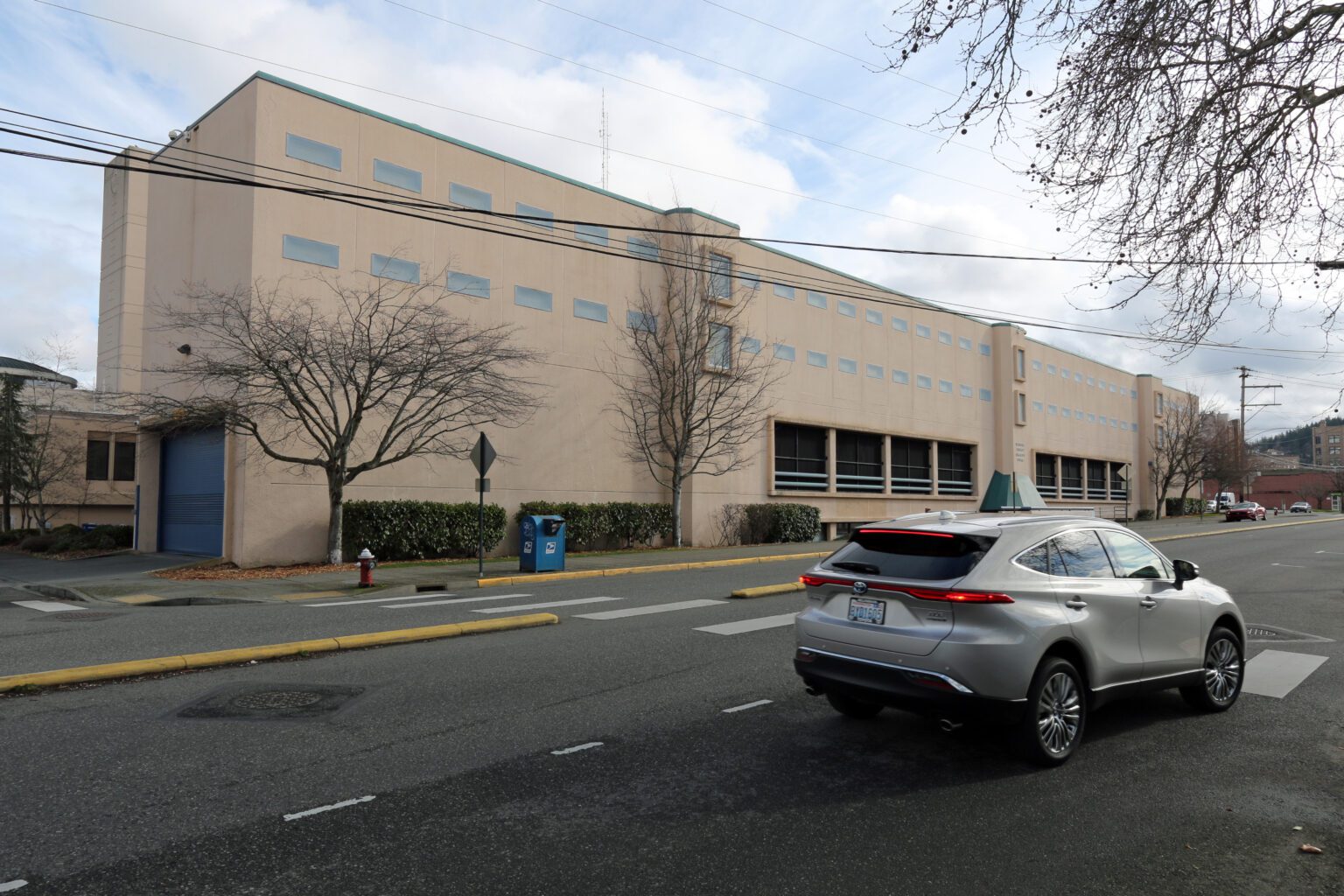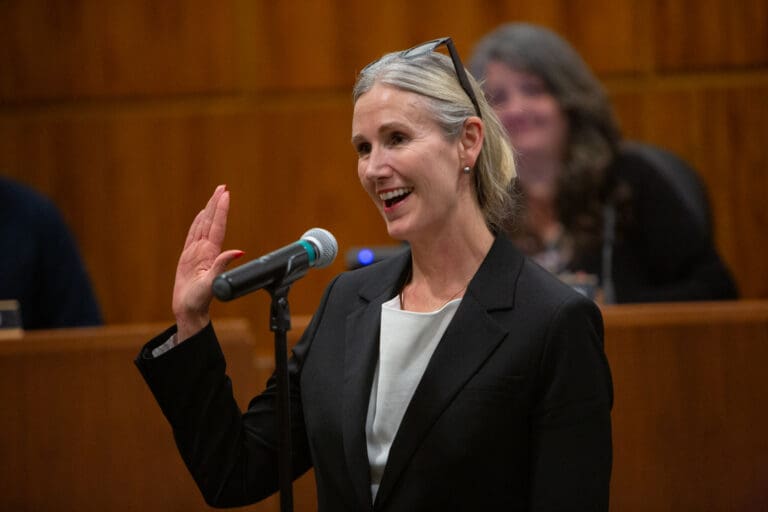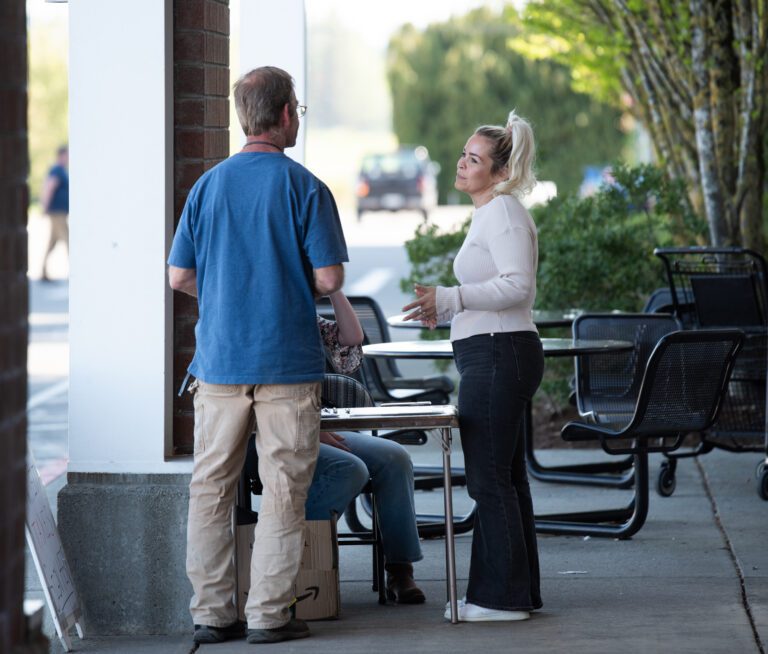Whatcom County leaders’ vision for a new jail — and a new raft of support services to keep people out of jail — has been outlined for the public in advance of a Nov. 7 ballot measure that will ask voters to approve a sales tax increase.
The picture is incomplete, however. Officials say a jail to replace the current downtown Bellingham facility and the Interim Work Center on Division Street will most likely be constructed on LaBounty Road in Ferndale. Next to that will likely be a behavioral care center for a few dozen offenders who qualify for mental health or substance use treatment instead of lockup.
Big questions in the minds of voters remain unanswered: How many inmates will the jail hold, and how much will it cost?
The Whatcom County Council approved the jail plan and proposed ballot measure for a 0.2% sales tax after a marathon five-and-a-half-hour meeting on Monday, June 26. Council members and dozens of individuals on advisory committees have worked for the past 18 months to strike a balance between incarceration and rehabilitation: putting dangerous people behind bars while giving people with behavioral health disorders the help they need.
Just before Monday’s council vote, county Executive Satpal Sidhu called the jail plan a “great compromise.”
“Everybody got something really dear to them, and that is a good example of compromise,” he said.
The unknowns
County officials have a conceptual cost estimate, but voters should not expect it to be the final bill: $137 million for a 440-cell jail at the Ferndale site. The capacity is based on a jail 20% larger than the combined size of the downtown jail and the Work Center, but 440 beds aren’t enough to lift existing booking restrictions, Sheriff Bill Elfo said. The restrictions now in place due to jail overcrowding prevent law enforcement from booking many nonviolent offenders or people with warrants — even felony warrants.
The size of the new jail — something in the neighborhood of 500 beds or less — has been influenced largely by the mayors from Whatcom County’s seven cities. They asked for a jail big enough to allow the sheriff to lift booking restrictions — and they have a lot of leverage.
County officials want the cities to share some of their cut of the sales tax increase, which is 40% of the total. So voters can expect the new jail will have more than 440 beds.
City leaders got another thing on their wish list: an automatic trigger for expanding the jail if it starts nearing capacity.
The financials
The county executive’s office convinced council members to accept another element of the plan. A large majority of the sales tax collected in the first four to six years will pay for jail construction, with a relatively small amount left over for treatment, transitional housing and other services.
The money available for social services would increase dramatically around 2030, after the county pays down the debt on its jail construction bond. The plan calls for spending at least half of the tax revenue after 2030 on services.
Whether or not the jail proposal is the “great compromise” the county executive called it will ultimately be decided by voters on Nov. 7. But before the measure makes it to the ballot, the council must take a second vote on the ordinance sometime in July, after a public hearing on July 11.
The council is required to convene the hearing, but any public comment at this stage is highly unlikely to change anything. Council members are up against an Aug. 1 deadline to give final approval to the jail measure so it can appear on the November ballot.
The public already had multiple opportunities to weigh in. Over the past year, the county has heard from the broader community at two town hall meetings, while also reaching out to more focused groups: previous and current inmates, members of the immigrant community and local Indigenous tribes, people of color, and social-service providers.
The jail proposal also worked its way through two separate committees: the Stakeholder Advisory Committee — intended to represent a broad spectrum of the public — and the Incarceration Reduction and Prevention Task Force, which approved the plan on June 12.
Key members of the task force voted against the plan, however: Northwest Youth Services Director Jason McGill, Chuckanut Health Foundation Director Heather Flaherty, public defender Maialisa Vanyo and Arlene Feld, a longtime advocate for social services.
One sticking point for the dissenters was the decision to commit a large majority of the sales tax revenue in the first four to six years toward jail construction, leaving roughly $1 million to $2 million a year for behavioral health care.
“One and two million dollars a year, are you kidding?” Feld said at the June 12 task force meeting.
“I have been working for the expansion of social services in Whatcom County for more than 10 years,” Feld added. “And this is the moment, the opportunity, the time when it could happen. But in this plan, it has not happened.”
After Feld’s statement, Sidhu issued a memo to county council saying more than $2 million a year should be available for social services in the next four to six years, if future councils add those funds to the county budget, or if state funds become available.
McGill spoke even more forcefully against the jail proposal.
“This is a terrible plan,” he said, adding that waiting five or more years before putting significant funding into social services is “not how it works.”
“This is not what BIPOC folks are saying in this community,” McGill said, using the acronym for Black and Indigenous people of color. “This is not what people with lived experience are saying in this community.”
Bellingham Mayor Seth Fleetwood spoke in support of the financing strategy at the task force meeting.
“This is the means by which we get our hands on several more million dollars annually for many decades, for behavioral health,” Fleetwood said.
Officials who support the plan also noted that the state and federal governments can provide millions more for services before the new sales tax provides those funds starting around 2030.
Current estimates put the total funding available for services from the countywide sales tax in the hundreds of millions of dollars over 30 years. The plan for the 2017 jail ballot measure indicated $30 million would be available for incarceration-reduction programs over 30 years. That measure was soundly rejected by voters, 59% to 41%.
Three out of seven council members in 2017 voted against putting the measure on the ballot, including current councilors Barry Buchanan and Todd Donovan. The initial vote on the ballot measure this time around was 5–1, with only council member Ben Elenbaas dissenting.
Elenbaas said he might change his vote to “yes” when the measure comes up for final approval, likely on July 11.
“This time around the process was much different, so it’s not surprising that the results are also different,” Sidhu said in a prepared statement. “The [plan] strikes a good balance between investment in a new jail that is safe and humane, and investment in services that help people in need and prevent crime and incarceration.”
This story was updated at 8:55 a.m. on June 28 to add a statement from the Whatcom County executive that more than $2 million a year should be available in the near term for social services.




